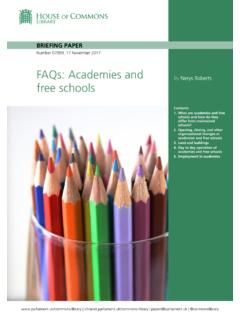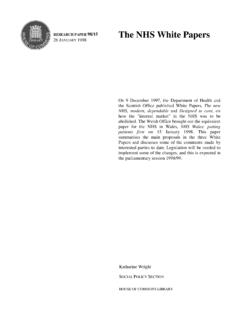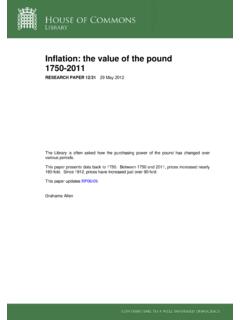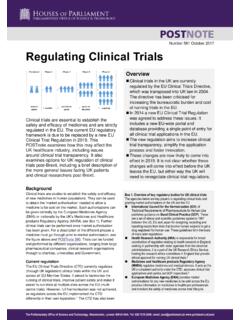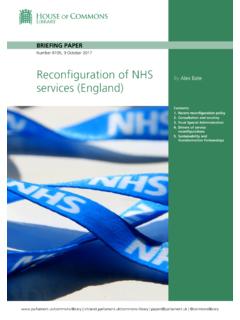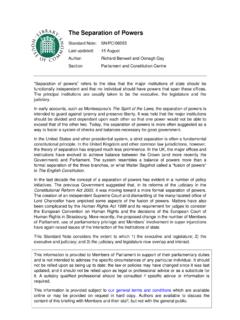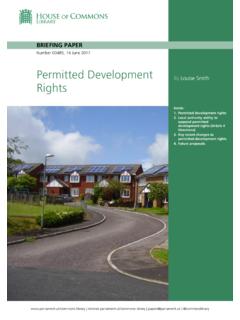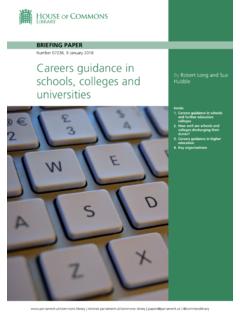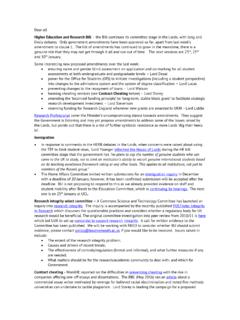Transcription of Fly-tipping - the illegal
1 BRIEFING PAPER. Number CBP05672, 25 June 2018. Fly-tipping - the illegal By Louise Smith dumping of waste Inside: 1. The problem of Fly-tipping 2. What are the penalties for Fly-tipping ? 3. What is the scale of the problem? 4. Responsibilities and powers 5. Reporting Fly-tipping 6. Government proposals for change | | | @commonslibrary CBP05672, 25 June 2018. Contents Summary 3. 1. The problem of Fly-tipping 4. What is Fly-tipping ? 4. What are the impacts of Fly-tipping ? 4. Why is there a problem? 5. What has the Government done to tackle Fly-tipping ? 6. 2. What are the penalties for Fly-tipping ? 8. Current penalties 8. Introducing fixed penalty notices in England for small-scale Fly-tipping 9.
2 3. What is the scale of the problem? 11. Fly-tipping data 11. Fly-tipping trends 11. 4. Responsibilities and powers 14. Waste duty of care 14. Local authority responsibility 15. The Environment Agency responsibility 15. Private landowner responsibility 16. Calls for change 17. Government's view 18. Powers available to require the clearance of fly-tipped waste 19. 5. Reporting Fly-tipping 20. 6. Government proposals for change 21. Contributing Authors: Sara Priestley and Alison Pratt, Science and Environment Section Cover page image copyright: Attributed to: It Makes Me Mad by Sebastian Ballard. Licensed under CC BY / image cropped. 3 Fly-tipping - the illegal dumping of waste Summary As waste is a devolved issue, this briefing paper focuses on England, unless otherwise specified.
3 Information on Scotland, Wales and Northern Ireland can be provided to Members and their staff on an enquiry by enquiry basis. What is fly tipping ? Fly-tipping is the illegal disposal of household, industrial, commercial or other 'controlled' waste without a waste management licence. The waste can be liquid or solid. Fly-tipping is not the same as littering. More information on litter can be found in the Library Briefing Paper on Litter. How big is the problem? The most recent Government Fly-tipping statistics for England, 2016/17, show that: 1. For the 2016/17 year, local authorities in England dealt with around 1 million (1,002,000) Fly-tipping incidents, a 7% increase from the previous year.
4 2. Two thirds (67%) of fly-tips involved household waste. Total incidents involving household waste increased by 8% from 2015/16. 3. The estimated cost of clearance for Fly-tipping to local authorities in England in 2016/17 was million. Responsibility for fly tipping and powers to require clearance Local authorities are responsible for investigating, clearing and taking appropriate enforcement action in relation to small scale Fly-tipping on public land. In England the Environment Agency is responsible for dealing with larger-scale fly- tipping (more than a lorry load), hazardous waste and Fly-tipping by organised gangs. On private land, it is normally the responsibility of the landowner to remove the waste and dispose of it legally.
5 Local authorities and the Environment Agency have legal powers to require landowners to clear fly-tipped waste from their land. They also have powers to enter the land and clear it, and may seek reimbursement for costs related to it. Penalties for Fly-tipping Fly-tipping is a criminal offence punishable by a fine of up to 50,000 or 12 months imprisonment if convicted in a Magistrates' Court. The offence can attract an unlimited fine and up to 5 years imprisonment if convicted in a Crown Court. There are also a number of other possible penalties, including fixed penalty notices and having a vehicle seized. Concern about costs to private landowners Concern has been raised about the costs involved to private landowners of clearing fly tipped waste from their land and several campaigns have been launched calling for change in this area.
6 The Government has said that it does not intend to change the law here. Government plans for reform The Government has concerns about the situation where householders allow an unauthorised person to take their waste away, and where the waste is then fly-tipped. In January 2018 it published a consultation on proposals to tackle crime and poor performance in the waste sector & introduce a new fixed penalty for the waste duty of care. Further proposals related to fly tipping are expected in a forthcoming Resources and Waste Strategy. Number CBP05672, 25 June 2018 4. 1. The problem of Fly-tipping What is Fly-tipping ? Fly-tipping is the illegal disposal of household, industrial, commercial or Fly-tipping is the other controlled' waste without a waste management licence.
7 The illegal disposal of waste can be liquid or solid; controlled waste includes garden refuse waste without a and larger domestic items such as fridges and mattresses. waste management licence. It is a criminal Fly-tipping is a criminal offence pursuant to section 33 of the offence. Environmental Protection Act 1990: a person shall not deposit controlled waste, or knowingly cause or knowingly permit controlled waste to be deposited in or on any land unless a waste management licence authorising the deposit is in force and the deposit is in accordance with the licence. There is also an associated offence relating to the unlawful deposit of waste from a motor vehicle whereby the person who controls or is in a position to control the vehicle shall be treated as knowingly causing the waste to be deposited whether or not he or she gave any instructions for this to be done.
8 1. Fly-tipping is not the same as littering. More information on litter can be found in the Library Briefing Paper on Litter: key trends, policy and legislation in England. What are the impacts of Fly-tipping ? The Department for Environment, Food and Rural Affairs (Defra) stresses the range of impacts of Fly-tipping : Fly tipping is a significant blight on local environments; a source of pollution; a potential danger to public health and hazard to wildlife. It also undermines legitimate waste businesses where unscrupulous operators undercut those operating within the law. 2. In 2016, the Parliamentary Under-Secretary of State Communities and Local Government (Mr Marcus Jones) has described both litter and fly- tipping as: antisocial environmental crimes that pose risks to human health and animal welfare, spoil relationships between neighbours and their wider community, and affect the way people feel about the place that they call home.
9 3. In 2016/17, the estimated cost of clearance of Fly-tipping to local authorities in England was million, a 16% increase from the previous year, where it was reported to be million. 4 In Wales it costs local authorities nearly 2 million a year. 5 According to a 2015. 1. Section 33(5), Environmental Protection Act 1990 (as amended). 2. Defra, Fly-tipping statistics for England, 2013 to 2014, last updated 4 February 2015. [accessed 14 September 2015]. 3. HC Deb 15 February 2016: Column 187WH. 4. Defra, Fly-tipping statistics for England, 2016/17, dated October 2017. 5. Welsh Government, Fly-tipping , last updated 12 January 2017 [accessed 21 June 2017]. 5 Fly-tipping - the illegal dumping of waste Government consultation, various sources have estimated the cost of Fly-tipping on private land as between 50- 150 million a year.
10 6. Why is there a problem? The National Fly-tipping Prevention Group (NFTPG) notes that the causes of Fly-tipping are many and varied, including: financial gain or saving by the perpetrator;. a lack of waste disposal facilities or access to them; and laziness and an attitude that someone else will clear up the waste. 7. The House of Commons Communities and Local Government Committee highlighted some of the evidence it had received to explain the increase in Fly-tipping cases in its March 2015 Report on Litter and Fly-tipping in England: The Government considered that the increase may, in part, be due to more incident being reported by local authorities due to a new online reporting facilities; whereas witnesses representing local councils and landowners pointed to the introduction of charges for collection of household items and garden waste by waste collection authorities.

